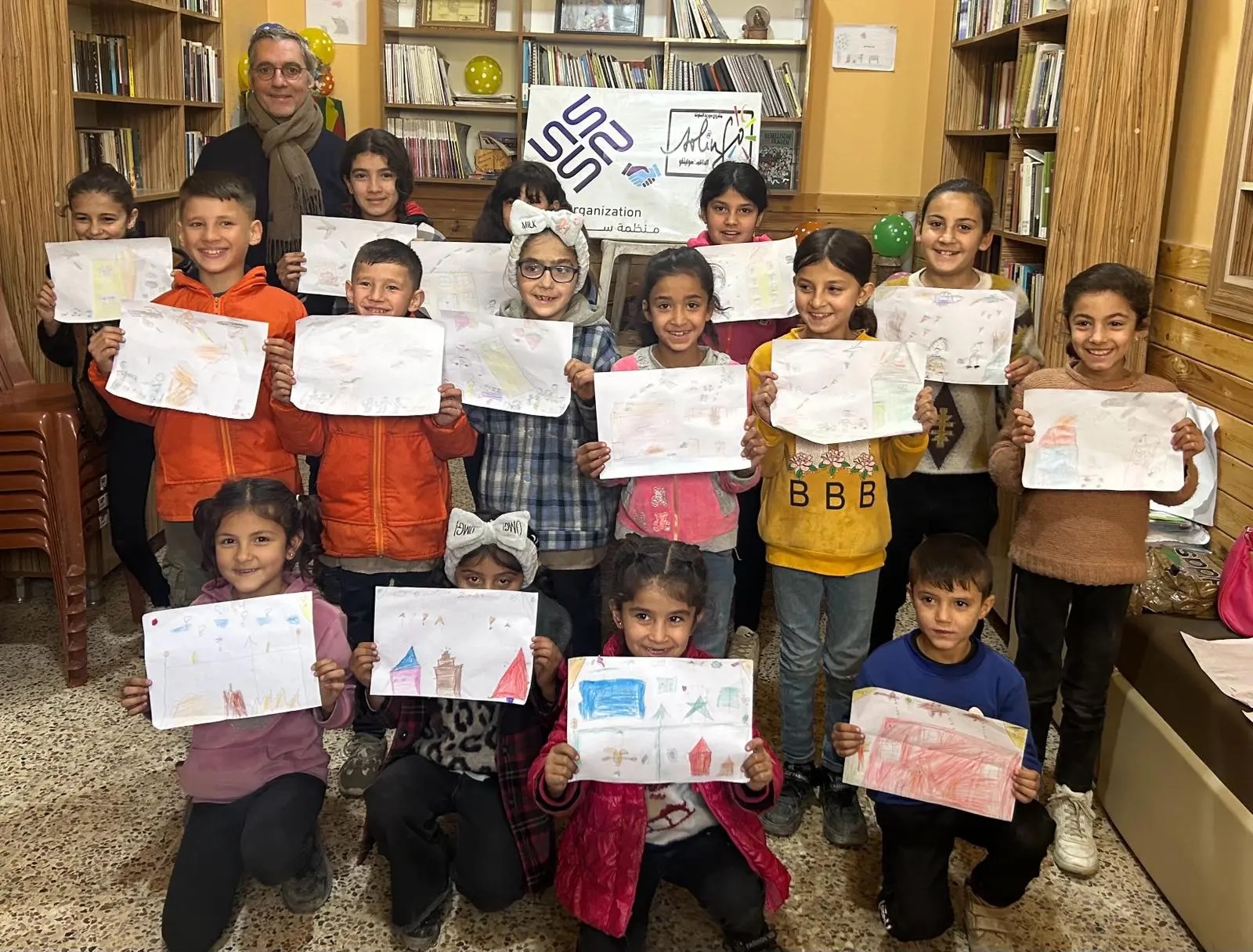The Kurdish Misfortune
Edouard Lagourgue, President of Solinfo, has been traveling to Kurdistan since the 1990s. Recently, he has led several humanitarian missions to Iraq and Syria, sharing his updated and comparative insights on both Kurdistans with Défis Humanitaires.
“The Kurdish Misfortune”… as described by Gérard Chaliand, Kurdistan is once again facing an existential threat away from the spotlight. Solinfo, a French NGO, has been intervening in both Iraqi and Syrian Kurdistan since 2012, conducting psychosocial support sessions and art therapy workshops for children affected by war, displaced from Kobané to Raqqa, as well as for orphans and youths in Erbil and Sulaymaniya.
In Syria, today, in the midst of winter, over 12 million Syrians, or 65% of the population, do not eat regularly according to the World Food Programme (WFP) and are in need of vital humanitarian aid. In Northeast Syria (NES), rates of acute and chronic malnutrition are twice as high as the national average. This primarily affects the displaced in NES, who are increasingly fleeing conflict zones. The Office for Humanitarian Affairs (OHA) based in Raqqa laments the marked disengagement in humanitarian efforts, evidenced by reduced contributions and the dwindling number of active international NGOs.
In Iraq, the Kurds in the north no longer have autonomous access to income from their oil resources and are facing a major financial crisis. Government employee salaries (nearly 40% of the population) are being delayed by 3 to 4 months. This threatens the social balance of the region.
At the same time, both Kurdistans fear the departure of the Western anti-terrorist coalition stationed in Northeastern Syria (NES) and the Iraqi Kurdistan Region (IKR). Indeed, the central government in Baghdad and the Syrian government are not fond of the Kurds’ desire to consolidate their autonomy on internationally recognized territories as their own.
The Kurdish-populated regions, mainly divided between Iran, Turkey, Syria, and Iraq, comprise a population of nearly 40 million individuals. The promises of the Treaty of Sèvres in 1920, which announced the creation of a Kurdish state on the ruins of the Ottoman Empire, were short-lived. Since then, mistreated and sometimes denied in their identity by their national states, the Kurds are once again threatened in the current geopolitical context, amplified by the consequences of the war between Israel and Hamas.
In Northern Iraq or Iraqi Kurdistan, the regional government of Kurdistan (KRG) is dominated by the Kurdistan Democratic Party and also includes the PUK (Patriotic Union of Kurdistan), various parties such as the Assyrian or Yazidi parties. The current president of Iraq, Abdel Latif Rashid, is from the PUK.
It is currently observed that the tension is once again high in Iraqi Kurdistan, exacerbated by the financial conflict with the central government and international tremors related to the Gaza conflict. This is manifested by attacks by Shiite militias under Iran’s orders on international coalition bases and opportunistic destructions by the Turks on sites supposedly sheltering the Kurdistan Workers’ Party (PKK). The Iranians thus weigh on Iraq to secure the departure of international coalition forces.
In Iraqi Kurdistan, road, agricultural (large farms), energy, real estate, educational, and productive (factories) infrastructures have significantly developed in recent years thanks to oil revenues, foreign investments, and many Iraqi businessmen from other regions. The slowdown in oil windfalls leads to a decrease in public spending and an economic crisis, even though the central government in Baghdad could eventually disburse a portion of the oil revenues due to the KRG, currently the subject of negotiations and hope.
Thus, Iraqi Kurdistan does not wish to lose the protection of international coalition forces and its financial autonomy, which would threaten the very balance of the Iraqi Kurdistan region.
In Syria, Northeastern Syria (NES) includes Rojava with the main Kurdish cities (Qamishli, Kobane, Hassaké, Afrin) and the province cities of Raqqa, Manbij, Deir ez-Zor, Shaba in Aleppo, which make up the NES under a democratically managed autonomous administration by Kurdish, Arab, and Syriac representatives.
It’s notable that NES has the presence or occupation of all actors in the Syrian conflict: Syrian government, Russia, Iran, coalition of Western forces, Syrian Democratic Forces (SDF), Turkey and its armed wing, the National Army, and other jihadist groups. The configuration of these heterogeneous forces is quite complex with a geographical presence spread across the entire Syrian territory. These parameters make NES very fragile in the face of initiatives by various political and military actors whose fundamental interests are deeply divergent. The Kurdish ethnicity remains a minority in the territory it controls. For now, movements of some Arab tribes, the resurgence of jihadist pressure, attacks by Iranian proxies on coalition bases, and pressure from Turkey destroying electrical, hydraulic, agricultural infrastructure, targeted drone strikes, reducing the water level of the Euphrates, make the situation in NES extremely unstable.
At the same time, on a social level, the population of NES experiences extreme poverty with an average income estimated at 40 US$/month. They face unprecedented annual inflation that makes life unbearable in the region. For example, the price of bread (standard bag) has gone from 500 to 1000 Syrian Pounds in a year. The population lives in a state of survival, resigned, without hope for a better life, with growing uncertainty about the future, and a malaise that affects even the most talented. This encourages emigration, even though the Turkish border seems dissuasive and dangerous for those attempting to cross.
Northeastern Syria is also hanging by the thread of the departure of international coalition forces under pressure from Iranian proxies, threatened by Turkey’s desire to extend control over the northern border, and finally under pressure from the Syrian regime as well as the real threat of a resurgence of armed jihadist groups.
This chaos setting in Kurdistan away from the spotlight raises two humanitarian challenges: access to populations in danger and the financing of humanitarian aid under these circumstances.
Thus, both Kurdistans are hanging by the rumor of the threat of the departure of international coalition forces, whose mandate, it is worth remembering, is to combat the resurgence of international jihadism, not to defend the autonomy of the Kurds in Iraq or Syria. Some may not have forgotten this and will play on it in the months to come… the Kurds are aware of this and want to convince that they are still reliable allies of peoples threatened by jihadist terrorism.
You can find this article and many others on the website of Défis Humanitaires.

